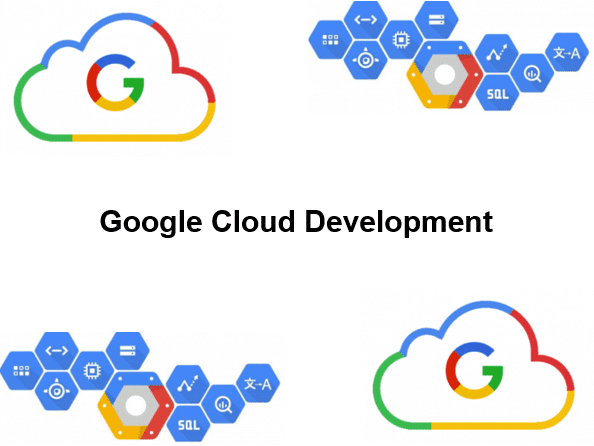-
Learning by doing
-
Trainers with practical experience
-
Classroom training
-
Detailed course material
-
Clear content description
-
Tailormade content possible
-
Training that proceeds
-
Small groups
In the course Google Cloud Development participants learn to use the Google Cloud Platform for developing and deploying Cloud Applications and Services. With the Google Cloud platform you can create and manage applications in the cloud. The applications are then hosted in a network of Google data centers and it is no longer necessary to purchase and manage a local server.
The Google Cloud Development course starts with an overview of the services and the Zones and Regions that the Google Cloud Platform has to offer. The Pay as you Go pricing model and renting services are discussed as well.
Next Google's Compute Engine is covered with which virtual machines can be created and loaded into Google's Cloud infrastructure. Attention is also paid to Google's App Engine with which web and mobile applications can be made in various programming languages and which are the executed on a managed and serverless platform.
The various forms of storage that the Google Cloud has to offer are also on the program of the course. Treated are Object Storage, Cache and
Persistent Storage. Cloud SQL for accessing relational databases and NoSQL data access in the Google Cloud will also be discussed.
Attention is also paid to networking with Google Cloud, including setting up a Virtual Private Cloud and Virtual Private Networks. This also includes the configuration of Cloud DNS and setting up Load Balancing.
Next it is explained how Google Cloud supports serverless computing with Cloud Functions. With serverless computing, servers run in the cloud without the need to configure them. The function lifecycle, the Cloud Functions Dashboard and HTTP Triggers are covered.
Finally attention is paid to how a Kubernetes cluster can be set up in Google Cloud. Explained are containers orchestration, managing nodes and pods and monitoring a Kubernetes Cluster.
The course Google Cloud Development is intended for developers who want to use Google Cloud to develop and deploy cloud applications.
Experience with a modern programming language such as C#, Java, Python or PHP is required to participate in this course.
The theory is treated on the basis of presentation slides and demos. During the course theory and exercises are interchanged. The course material is in English. Course times are from 9.30 to 16.30.
After successful completion of the course participants receive a certificate Google Cloud Development.

Module 1 : Google Cloud Intro |
Module 2 : Compute Engine |
Module 3 : Cloud Data Access |
|
What is Google Cloud? Types of Cloud Services Compute Resources Storage Services Networking Services Specialized Services Elastic Resource Allocation Developer Tools Zones and Regions Cloud Shell Cloud SDK Pay as You Go Pricing Renting Resources |
Virtual Machine Images VM Projects VM Configuration Preemptible VM's Custom Machine Types VM Creation Network Access Monitoring VM's Instance Groups Computing with App Engine App Engine Components Deploying an App Scaling App Engine Apps |
Types of Storage Object Storage Cache Persistent Storage Storage Data Models Cloud SQL Relational Databases Connecting to MySQL Importing Data Exporting Data Backing Up MySQL Managing Cloud Storage NoSQL Datastore |
Module 4 : Networking |
Module 5 : Cloud Functions |
Module 6 : Kubernetes |
|
Virtual Private Cloud VPC with Subnets Creating Firewall Rules Virtual Private Network VPC with Cloud Console Configuring Cloud DNS DNS Managed Zones Types of Load Balancers Configuring Load Balancers Managing IP Addresses Expanding CIDR Blocks Reserving IP Addresses Accounts and Groups |
What are Cloud Functions? Serverless Computing Events and Triggers Event Object Runtime Environments Function Lifecycle Deploying Cloud Functions Cloud Functions Dashboard Event from Storage Events from Pub/Sub HTTP Triggers Using gcloud Deleting Functions |
Intro Kubernetes Engine Kubernetes Clusters Kubernetes Architecture Deploying Clusters Kubernetes Objects Nodes and Pods Containers Deploying Pods Monitoring Kubernetes Managing Nodes Managing Pods Kubernetes Services View Image Repository |
